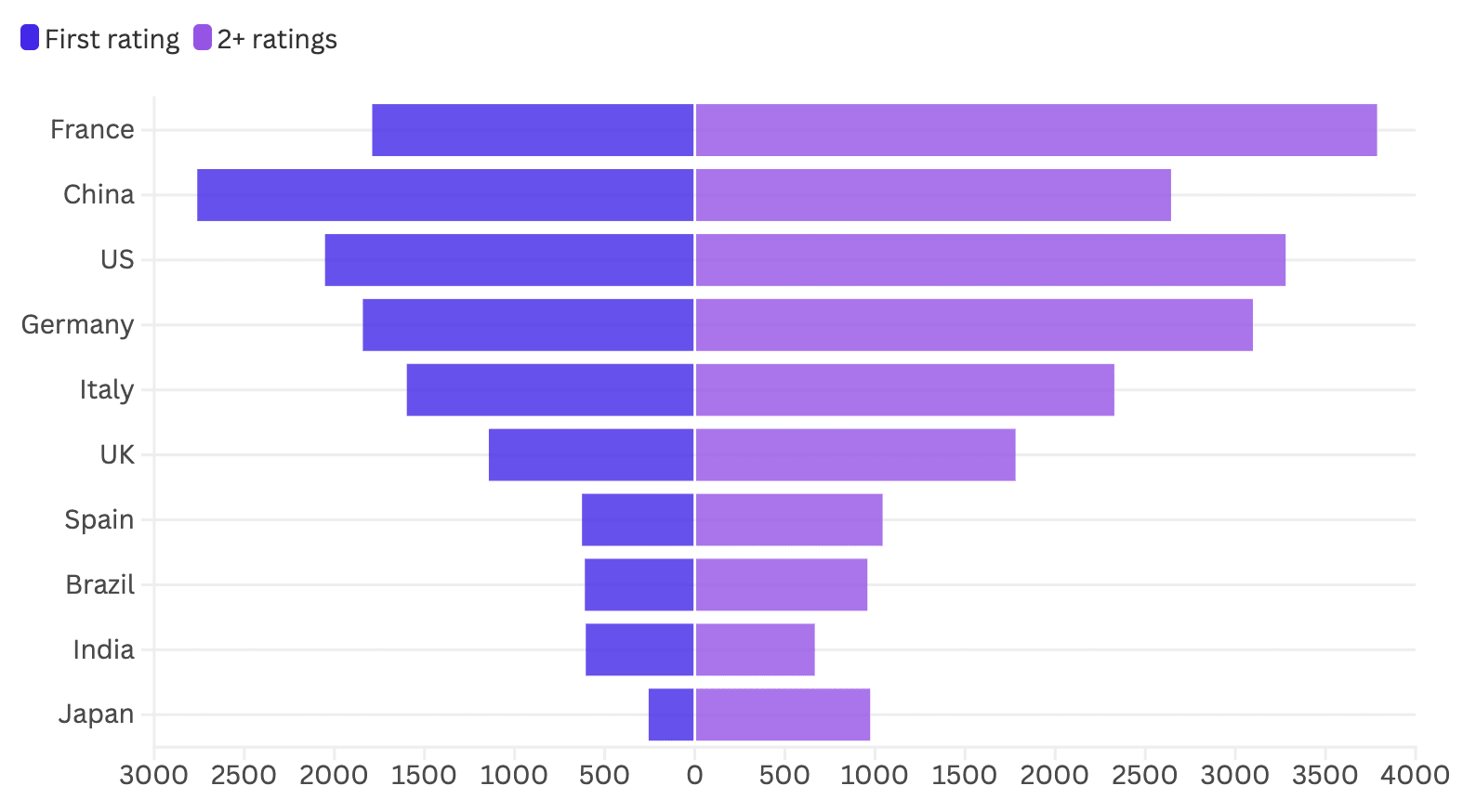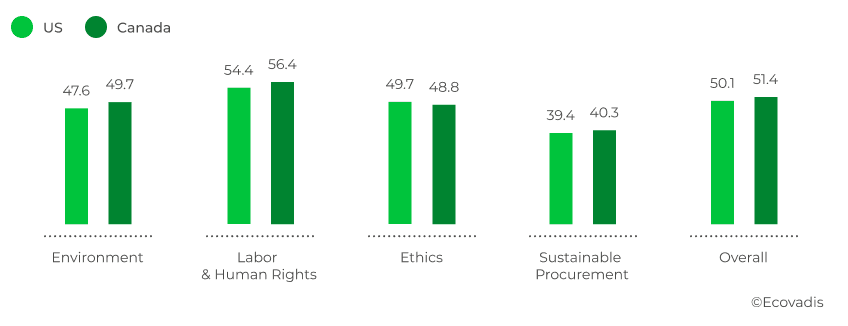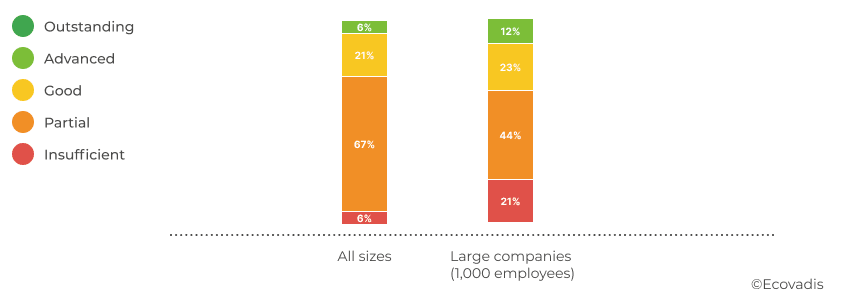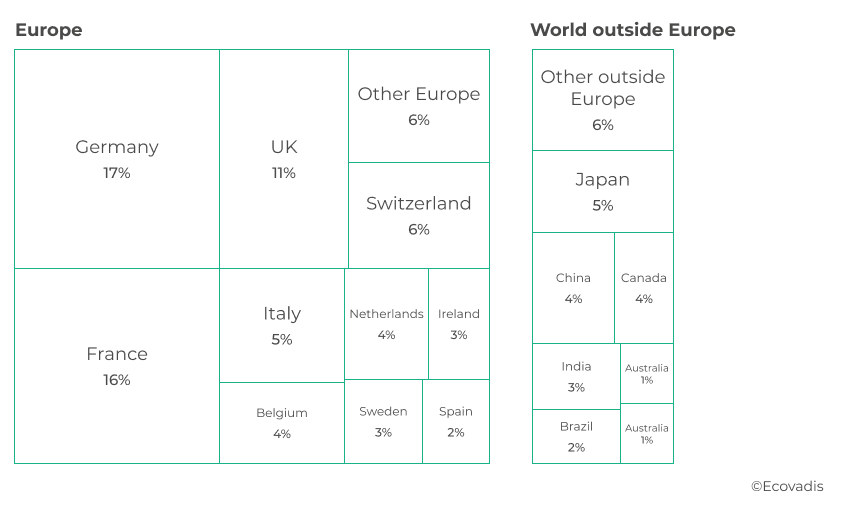This year’s Global Supply Chain Sustainability Risk & Performance Index report comes at a critical moment for global business. Companies are navigating rising geopolitical tensions, shifting trade dynamics and intense polarization around ESG. While some are pulling back in response to the uncertainty, others are leaning in – strengthening and investing in their sustainability programs to respond to immediate challenges while building long-term resilience. Our recent survey of 400 US executives from leading companies revealed that 87% have either maintained or increased their investment in sustainability since the start of 2025.
This article draws on insights from our recently published Index to explore the sustainability performance of more than 10,000 US companies rated by EcoVadis since 2020 – including nearly 5,000 this year. It highlights key trends, progress and critical gaps, and how US companies are stacking up against global peers.
|
A Look at the 2024 Index dataset The Index dataset – one of the most comprehensive of its kind – covers a five-year period from 2020 to 2024. It is based on data from 159,000 EcoVadis Ratings conducted since 2020, including 49,000 in 2024. These ratings examine a company’s performance across four core sustainability themes (and hundreds of specific indicators): Environment, Labor & Human Rights, Ethics and Sustainable Procurement. The 89,000 companies rated since 2020 span more than 150 countries and 250 industry categories. |
US sustainability ratings engagement is deepening – but growth remains slower than many global peers
There was a global push toward supply chain transparency in 2024, reflected in significant growth in ratings volumes across every region. Despite the US’ modest 13% increase – below the network average of 23% – it remains one of the top three countries by annual ratings volume, behind only France and China. Sixty-one percent of US companies were rated for the second time or more in 2024, highlighting deepening engagement and an ongoing commitment to sustainability improvement.
Other countries are seeing faster growth. More than 5,400 companies were rated in China in 2024 – a 37% increase over the previous year that allowed the country to narrowly surpass the US for second place globally.
Figure 1: Countries with the most assessments (2024): first-time ratings vs. 2+ ratings

Steady gains are being made – but performance gaps remain
US companies in the EcoVadis network are making measurable sustainability progress, driven by growing recognition of the ROI of their efforts and increasing pressure from both domestic and international buyers for transparency and improvement. While the fragmented ESG landscape no longer provides a clear direction, many are still making meaningful gains and embedding sustainability best practices into their operations.
US companies gained 1.4 points on average in 2024 on our 0-100 scoring scale (compared to the network average of 1.7 points), with both first-time and multi-rated companies improving. In Canada, the overall average flatlined largely due to lower baseline scoring among the influx of new companies into the network. Still, Canadian companies continue to outperform their US peers overall (51.4 vs. 50.1) and across all themes except Ethics.
Figure 2: Average scores in the US and Canada across themes in 2024
To compare how the US stacks up against other countries, or globally, visit Index Online. This EcoVadis tool, which covers ratings through 2024, allows you to dive deeper into ratings data and create custom charts by country, region, industry, company size and EcoVadis assessment themes.

Large companies (1,000+ employees) continue to underperform relative to small (25-99) and medium-sized (100-999) enterprises (SMEs), though they are also more likely to lead in key areas. In 2024, 43% of large US firms were in the high to medium risk ranges (scoring below 45), significantly higher than the rates for SMEs at 27%. At the same time, large companies are twice as likely to reach Advanced performance (score above 65) on the Environment and Sustainable Procurement themes.
Across all company sizes, US companies continue to perform strongest on the Labor & Human Rights theme, with an average score of 54.4. However, they still trail top-performing countries – falling 9.6 points behind global leader Finland. Only 20% of US companies score below 45 on this theme, a comparatively low share. In contrast, the proportion of low performers nearly doubles for Environment (45%) and Ethics (39%).
Sustainable procurement: A key lever for improvement
Sustainable Procurement – historically the lowest-scoring assessment theme – rebounded in 2024, with US companies gaining 1.7 points after a period of stagnation. Despite this progress, 72% of companies in the country still fall within the Insufficient or Partial performance ranges, signaling limited to no supplier engagement on sustainability. As shown below, large companies are twice as likely to reach Advanced on this theme, but they also account for more than three times the share of performers in the high-risk Insufficient range. This split shows just how much untapped potential there is to improve sustainable procurement in the region. Rapid progress is possible: US and Canadian companies with multiple ratings are outperforming the first-rating baseline on this theme by nearly 8 points.
The US still trails most European countries on supply chain sustainability. While 72% of US companies fall into the Insufficient or Partial performance ranges, that number drops to just 40% in the Nordic countries. Still, US companies are ahead of many global peers. In China and India, more than a third of companies are in the high-risk Insufficient range – indicating little to no supplier engagement. In contrast, only 6% of US companies fell into this category in 2024 (roughly the same level as Japan).
Figure 3: Performance distribution on Sustainable Procurement theme in the US (2024)

Scorecard data from 2024 provides a glimpse into what these scoring differences translate into practice. Just 26% of large US companies reported conducting sustainability risk analyses of their suppliers before engagement – compared to 56% of their Nordic peers (Finland, Norway, and Sweden). In the Nordics, 80% of large companies conducted regular assessments of their suppliers’ social and environmental practices (vs. 46% among US companies), 36% built their capacity in these areas (19%), while 57% (21%) conducted on-site audits of their practices. SMEs in both the Nordics and the US are significantly less likely to implement these measures.
Figure 4: Sustainable procurement actions in place: US vs. Nordics in 2024 (companies with 1,000+ employees)
Cross-border ESG pressures are shaping US supplier engagement
An EcoVadis assessment typically begins when a strategic partner – referred to as the "requesting company" or "buyer" – invites a supplier to participate. Once this initial link is established and a sustainability scorecard is published, the results can be shared further with other companies within the EcoVadis network, creating a unique web of connections across global supply chains.
In 2024, US companies were involved in over 35,000 requests to share assessment results, spanning both domestic and international partners. About 75% of these connections extended beyond US borders, with American companies acting as the “requesting” party in 53% of cases. Fewer than 4% of the connections involved neighboring countries Mexico and Canada, meaning the vast majority linked the US to overseas partners.
Germany (17%), France (16%) and the UK (11%) are among the top countries with the most connections to US companies. The total number of links with EU/EEA countries (European Economic Area) stands at 58%, and with Europe as a whole at 75%.
Figure 5: The percentage of network links involving the US per other country (2024)

This strong engagement between US and European companies – where those in the US are more often in the “rated” role – is likely driven by multiple factors, including Europe's regulatory pressure and the growing maturity of the US sustainability ratings market.
EU regulations, such as the Corporate Sustainability Reporting Directive (CSRD) and the Corporate Sustainability Due Diligence Directive (CSDDD), are increasingly affecting non-EU companies with operations or supply chain ties in the bloc. These directives require comprehensive ESG disclosures and due diligence across value chains, prompting US companies that operate in or supply to Europe to engage with platforms like EcoVadis to demonstrate compliance and transparency. For many European buyers, requesting sustainability ratings from their US suppliers is becoming standard practice to meet regulatory obligations.
While US federal ESG disclosure rules continue to face legal and political hurdles, state-level regulations – such as California’s climate disclosure laws SB 253 and SB 261 – are on track for 2026 reporting. At the same time, investor and stakeholder pressure for transparency continues to grow. US companies are increasingly recognizing that robust sustainability performance, validated by third-party ratings, is essential for attracting investment, retaining customers and managing risk even in the absence of federal mandates. This shift is positioning the US as an increasingly sophisticated rated market where sustainability performance is a key competitive differentiator.
The path forward
Our data highlights a highly engaged network of companies – deeply integrated into global value chains, particularly in Europe – driven by both market expectations and evolving regulatory pressures. While US companies, especially those with multiple ratings, are showing steady progress, significant opportunities for acceleration remain. Large companies, in particular, need to sharpen their focus to close the performance gap with both SMEs and their European peers. Sustainable Procurement emerges as a key area for improvement across all company sizes, requiring more strategic investment in supplier risk analysis, assessments, and capacity building.
The increasing number of ratings and vast web of connections within the EcoVadis network underscore that sustainability is no longer a peripheral concern but a core component of business resilience and competitiveness. As the global landscape continues to evolve, understanding one's performance, benchmarking against industry leaders and proactively addressing weak points will be paramount for securing long-term success.
Ready to elevate your company’s sustainability performance and strengthen your position in the global value chain? Start or accelerate your sustainability journey today.
About the Author
Follow on Twitter Follow on Linkedin Visit Website More Content by EcoVadis EN





















